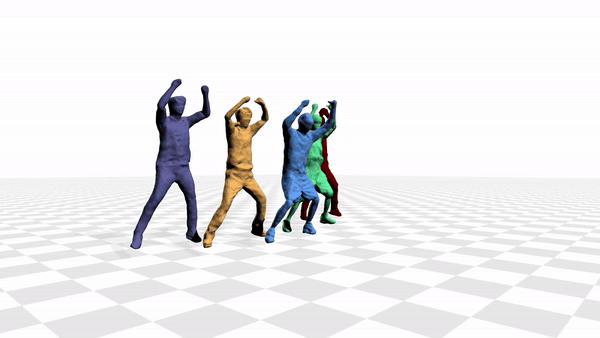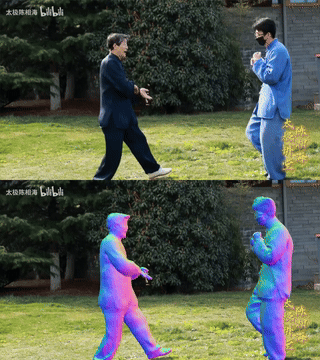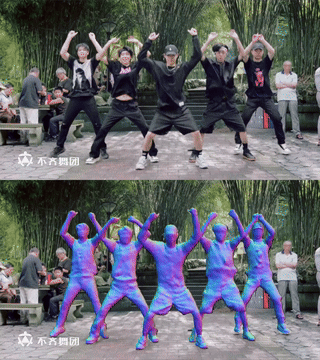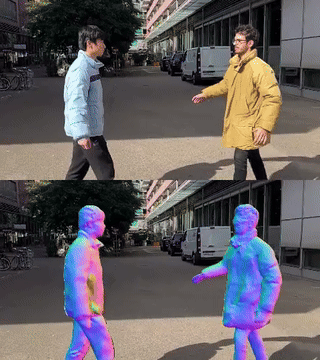Official Repository for CVPR 2024 paper MultiPly: Reconstruction of Multiple People from Monocular Video in the Wild.
- Clone this repo:
git clone https://github.com/eth-ait/MultiPly - Create a python virtual environment and activate.
conda create -n multiply python=3.7andconda activate multiply - Install dependenices.
cd MultiPly,pip install -r requirement.txtandcd code; python setup.py develop - Install PyTorch3D
- Install Kaolin. We use version 0.13.0.
- Download SMPL model (version 1.1.0 for Python 2.7 (female/male/neutral)) and move them to the corresponding places:
mkdir code/lib/smpl/smpl_model/
mv /path_to_smpl_models/basicmodel_f_lbs_10_207_0_v1.1.0.pkl code/lib/smpl/smpl_model/SMPL_FEMALE.pkl
mv /path_to_smpl_models/basicmodel_m_lbs_10_207_0_v1.1.0.pkl code/lib/smpl/smpl_model/SMPL_MALE.pkl
mv /path_to_smpl_models/basicmodel_neutral_lbs_10_207_0_v1.1.0.pkl code/lib/smpl/smpl_model/SMPL_NEUTRAL.pkl
- Download SAM model (if you have limited GPU Memory, try to download a smaller one vit_b. Remember to change the base model in
./code/lib/model/sam_model.py)
wget -P ./code/outputs/ https://dl.fbaipublicfiles.com/segment_anything/sam_vit_h_4b8939.pth
wget -P ./code/outputs/ https://dl.fbaipublicfiles.com/segment_anything/sam_vit_b_01ec64.pth
- Download the pretrained SDF human model
gdown 1-HvSz0enbBQIyJLnM0GJVrixj-1ycAJK -O ./code/outputs/
You can quickly start trying out MultiPly with a preprocessed demo sequence from Internet. This can be downloaded from Google drive. Put this preprocessed demo data under the folder data/.
Before training, make sure that the metaninfo in the data config file /code/confs/dataset/*.yaml does match the expected training video. You can also continue the training by changing the flag is_continue in the model config file code/confs/model/*_model.yaml. And then run:
cd code
python train.py
The training usually takes 24 * number_of_people hours. The validation results can be found at outputs/.
Run the following command to obtain the final outputs. By default, this loads the latest checkpoint.
cd code
python test.py
We use AITViewer to visualize the human models in 3D. First install AITViewer: pip install aitviewer imgui==1.4.1, and then run the following command to visualize the deformed mesh sequence and reproject it onto the corresponding frames:
cd ait_viewer_vis
python vis_mesh_image.py --input_root {input data folder} --output_root {Multiply output folder}
- It's better to install those package into separate environments, then specify the environment name in
run_preprocessing_multiply.sh. - Install TRACE for initial pose estimation and tracking.
- Install Vitpose for 2D keypoint detection. Download the pre-trained model from here, and save it as
preprocessing/vitpose/checkpoints/vitpose-h-multi-coco.pth - (Optional) Install OpenPose as well as the python bindings for better feet keypoints estimation.
- Install FFMPEG for video processing.
- Modify the preprocessing script
preprocessing/run_preprocessing_multiply.shaccordingly: the data source, data path, sequence name, environment name. The data source is by default "custom" which will estimate camera intrinsics. If the camera intrinsics are known, it's better if the true camera parameters can be given. - Run preprocessing:
cd preprocessingandbash run_preprocessing_multiply.sh. The processed data will be stored indata/. The intermediate outputs of the preprocessing can be found atpreprocessing/raw_data/{SEQUENCE_NAME}/ - Launch training and test in the same way as above. The
metainfoin the data config file/code/confs/dataset/*.yamlshould be changed according to the custom video.
We have used codes from other great research work, including VolSDF, NeRF++, SMPL-X, Anim-NeRF, Vid2Avatar, I M Avatar and SNARF. We sincerely thank the authors for their awesome work! We also thank the authors of ECON for discussing the experiment.
Here are more recent related human body reconstruction projects from our team:
- Vid2Avatar: 3D Avatar Reconstruction from Videos in the Wild via Self-supervised Scene Decomposition
- InstantAvatar: Learning Avatars from Monocular Video in 60 Seconds
- X-Avatar: Expressive Human Avatars
- Hi4D: 4D Instance Segmentation of Close Human Interaction
@inproceedings{jiang2024multiply,
title={MultiPly: Reconstruction of Multiple People from Monocular Video in the Wild},
author={Jiang, Zeren and Guo, Chen and Kaufmann, Manuel and Jiang, Tianjian and Valentin, Julien and Hilliges, Otmar and Song, Jie},
booktitle = {Proceedings of the IEEE/CVF Conference on Computer Vision and Pattern Recognition (CVPR)},
month = {June},
year = {2024},
}




